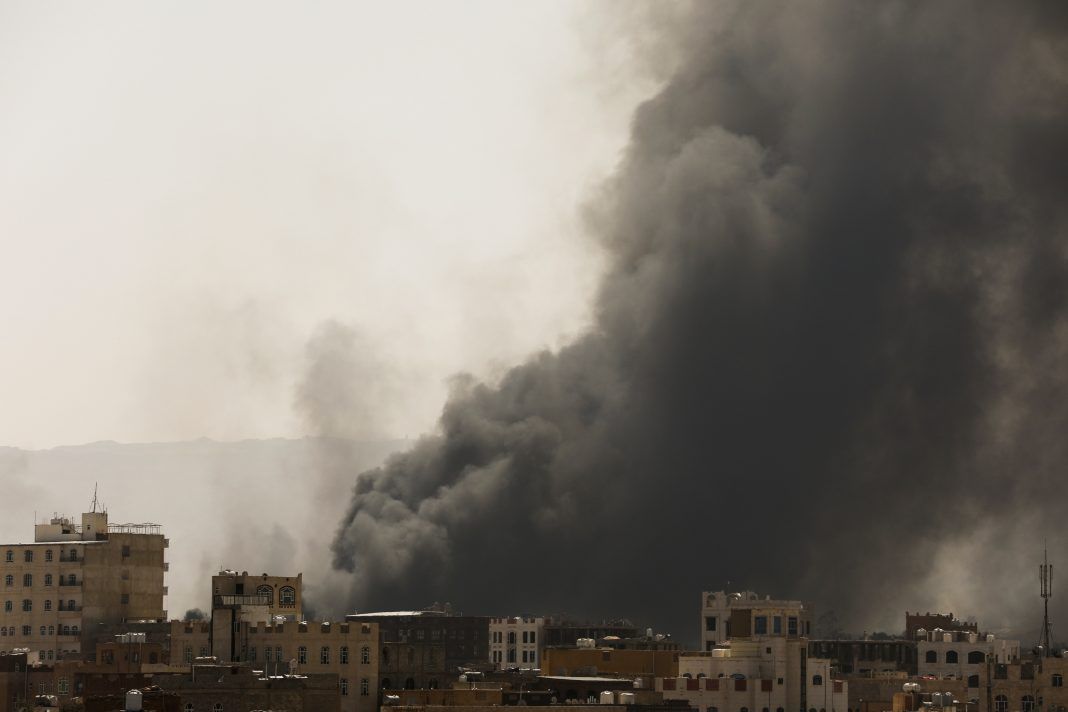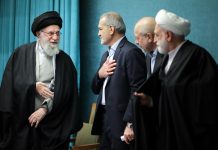DUBAI, March 8 (Reuters) – The United States said on Monday it is committed to defending Saudi Arabia following drone and missile strikes claimed by Yemen’s Iran-aligned Houthi movement, including on a Saudi facility vital to oil exports.
Saudi authorities said there were no casualties or property losses from Sunday’s attacks targeting an oil storage yard at Ras Tanura, site of a refinery and the world’s biggest offshore oil loading facility, and a residential compound in Dhahran used by state-controlled oil giant Saudi Aramco.
The attacks, which drove Brent crude prices above $70 a barrel to their highest since January 2020, come at a time of friction in the decades-old alliance between Saudi Arabia and the United States as President Joe Biden puts pressure on Riyadh over its human rights record and the ruinous Yemen war.
“The heinous Houthi assaults on civilians and vital infrastructure demonstrate lack of respect for human life and disregard for peace efforts,” the U.S. embassy in the kingdom said in an Arabic-language Twitter post.
“The United States stands by Saudi Arabia and its people. Our commitment to defend the Kingdom and its security is firm.”
The Houthis have been battling a Saudi-led coalition in Yemen for six years in a conflict largely seen as a proxy war between Saudi Arabia and Iran.
Saudi Defence Ministry spokesman Colonel Turki al-Malki, who also speaks for the coalition, said on Al Arabiya TV channel that Iran was smuggling missiles and drones to the Houthis. The group and Tehran have in the past rejected such charges.
Riyadh has repeatedly said that Iran‘s ballistic missile programme and support for regional proxies including in Yemen should be part of any talks aimed at reviving a nuclear pact with Iran that Biden’s predecessor Donald Trump quit.
The Houthi movement said its operation on Sunday using 14 drones and eight ballistic missiles also attacked military targets in the Saudi cities of Dammam, Asir and Jazan.
The coalition said it destroyed 12 Houthi drones, without specifying locations in the kingdom, and two ballistic missiles launched towards Jazan.
[aesop_image img=”https://kayhanlife.com/wp-content/uploads/2019/06/2019-06-14T140742Z_1_LWD00163TA0YZ_RTRWNEV_E_5443-YEMEN-SECURITY.jpg” panorama=”off” credit=”FILE PHOTO/ Reuters ” align=”center” lightbox=”on” captionsrc=”custom” captionposition=”left” revealfx=”off” overlay_revealfx=”off”]
INTERCEPTED
The Saudi defence ministry later said it had intercepted an armed drone coming from the sea before it could hit its target at Ras Tanura. Shrapnel from a ballistic missile fell near the residential compound used by Aramco.
The two sites in the Eastern Province are located on the Persian Gulf coast across from Iran and near Iraq and Bahrain, regional base of the U.S. Navy. Yemen lies nearly 1,000 km (600 miles) southwest on the Gulf of Aden.
Eastern Province has most of Aramco’s production and export facilities. In 2019, Saudi Arabia, the world’s top oil exporter, was shaken by a big attack on oil installations just a few km (miles) from the facilities targeted on Sunday, which Riyadh blamed on Iran, a charge Tehran denies.
The 2019 attack, which was claimed by the Houthis but which Riyadh said did not originate from Yemen, forced Saudi Arabia to temporarily shut more than half of its crude output.
The United States later sent American troops and military equipment to bolster the kingdom’s air and missile defences.
The Houthis have stepped up attacks as the United States and United Nations are pushing for a truce to revive stalled peace talks. Biden has declared a halt to U.S. support for offensive operations in Yemen but said Washington would continue to help Saudi Arabia defend itself.
On Sunday, the Saudi-led coalition said the Houthis were emboldened after the Biden administration revoked terrorist designations on the group imposed by Trump.
Last week, the U.S. Treasury Department imposed sanctions on two Houthi military leaders in the first punitive measures against the group by Biden’s administration following the spike in attacks on Saudi cities and battles in Yemen’s Marib region.
The Yemen war has killed tens of thousands of people and pushed millions to the brink of famine. The Houthis, who have controlled the capital since 2014, say they are fighting a corrupt system and foreign aggression.
(Reporting by Persian Gulf team, Ellen Francis and Maher Chmaytelli in Dubai; Writing by Ghaida Ghantous; Editing by Mark Heinrich)





